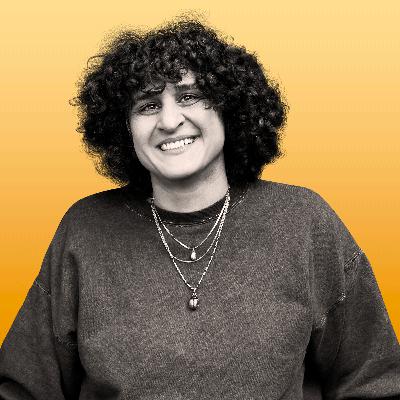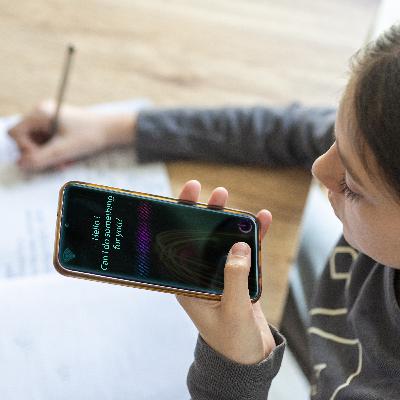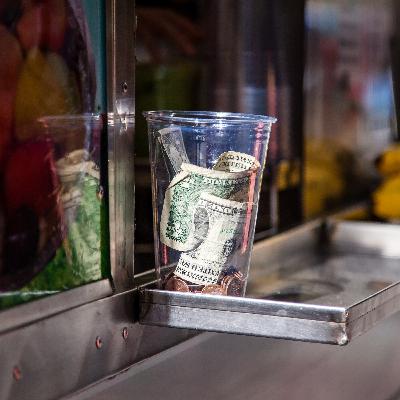Discover Apple News In Conversation
Apple News In Conversation

Apple News In Conversation
Author: Apple News
Subscribed: 725Played: 10,234Subscribe
Share
Copyright © 2022 Apple Inc. All rights reserved.
Description
Apple News In Conversation with Shumita Basu brings you interviews with some of the world’s best journalists and experts about the stories that impact our lives. Join us every week as we go behind the headlines.
213 Episodes
Reverse
With the release of her James Beard Award–winning cookbook, Salt, Fat, Acid, Heat, Samin Nosrat catapulted to international fame. But amid big life changes and loss in the years that followed, she struggled to redefine her connection to cooking. With her second book, Good Things, Nosrat is back with a fresh approach to preparing food — one that’s centered on spending precious time with loved ones. She sat down with Apple News In Conversation host Shumita Basu to talk about what makes a good recipe, her weekly dinner-party group, and how to alleviate the stress of cooking a high-stakes holiday meal.
Pulitzer Prize–winning photojournalist Lynsey Addario has spent the past two decades on the front lines of many of the world’s defining conflicts and humanitarian crises — from Iraq and Afghanistan to the Arab Spring, the Libyan civil war, and Russia’s invasion of Ukraine. A new documentary from National Geographic, Love+War, explores not only her extraordinary career in conflict zones but also her life at home in London with her husband and their two young sons. Addario sat down with Apple News In Conversation host Shumita Basu to talk about her high-risk work, motherhood, and what the film reveals about the complexity of both.
The United States has the highest maternal mortality rate among high-income nations — and, according to the CDC, more than 80% of maternal deaths are preventable. In her new book, Unbearable: Five Women and the Perils of Pregnancy in America, journalist Irin Carmon follows families as they navigate fertility struggles, pregnancy, birth, and loss within a health-care system that too often fails them. Carmon sat down with Apple News In Conversation host Shumita Basu to talk about how the history of maternal health care in the U.S. continues to shape the lives of pregnant people today.
Russell Vought, the director of the Office of Management and Budget, has become one of the most influential figures shaping Trump’s second term. He’s the main driver of efforts to weaken federal agencies and push through sweeping government layoffs. In a recent piece copublished by ProPublica and the New Yorker, reporter Andy Kroll reveals how Vought’s ideas about federal bureaucracy are being put into action. Kroll joins Apple News In Conversation host Shumita Basu to explain why some in Washington call Vought the “shadow president.”
Zohran Mamdani is leading New York City’s mayoral race by double digits. But not long ago, the democratic socialist was a relatively unknown state assemblyman. New Yorker staff writer Eric Lach recently profiled Mamdani, tracing his unique biography to his surprise primary win against former Gov. Andrew Cuomo. Lach joins Apple News In Conversation host Shumita Basu to talk about Mamdani’s sweeping campaign promises, the challenges of governing New York, and why this race matters for the rest of the country. Listen to the full interview on Apple Podcasts.This episode was published on Thursday, Oct. 23, when House Minority Leader Hakeem Jeffries had not yet endorsed Zohran Mamdani. Jeffries did so on Friday, Oct. 24.
Sports betting has exploded in the U.S.: The Supreme Court gave states the power to legalize it in 2018, and, by the end of this year, it will be allowed in 39 states and Washington, D.C. In his book Losing Big: America’s Reckless Bet on Sports Gambling, author Jonathan D. Cohen unpacks how this industry got so big and what its rise says about American culture. He spoke with Apple News In Conversation host Shumita Basu about the draw and dangers of sports gambling.
The rise of the Make America Healthy Again movement reflects a larger trend: declining trust in public-health institutions in the U.S. In response, the creators of a new podcast, Why Should I Trust You?, bring MAHA supporters and health experts together in a rare forum to foster understanding and explore solutions. Apple News In Conversation host Shumita Basu sat down with two of the hosts, Brinda Adhikari and Maggie Bartlett, to talk about what they’re learning from these conversations, and the surprising partnerships emerging along the way.
In just a few years, U.S. school districts have gone from blocking AI tools to welcoming them into classrooms. In a recent story for Bloomberg Businessweek, contributing writer Vauhini Vara reports on how these tools are being used — and what they mean for students, teachers, and the future of learning. Vara joins Apple News In Conversation host Shumita Basu to discuss the companies pushing AI into schools, the risks and promises of their products, and what might be lost — or gained — as classrooms adapt.
Earlier this month, conservative activist Charlie Kirk was fatally shot during an event at Utah Valley University. The public response has amplified political divisions, leaving many people feeling anxious about the state of the country. Sean Westwood, director of Dartmouth’s Polarization Research Lab, explains that while a few voices are stoking tensions, most Americans reject violence and want calmer politics. Westwood spoke with Apple News In Conversation host Shumita Basu about what the data reveals about polarization and political violence in the U.S. — and what it might take to turn the temperature down.
The Constitution has been amended 27 times, but the last meaningful change was over half a century ago. In her new book, We the People: A History of the U.S. Constitution, historian Jill Lepore argues that the near impossibility of amendment in recent decades underlies many of today’s political crises, from polarization to battles over the courts. Lepore spoke with Apple News In Conversation host Shumita Basu about the history of constitutional revision and why the amendment process matters for the future of American democracy.
When Christine was 9, her mother began having delusions that upended their family’s life. Her mother was eventually diagnosed with schizophrenia, but treatments had no effect. Nearly two decades later, after she started medication for cancer, her psychosis suddenly vanished. In the New Yorker, staff writer Rachel Aviv tells this remarkable story — and what it reveals about how schizophrenia is diagnosed and treated. The piece was selected as an Apple News Story of the Month. Aviv spoke with Apple News In Conversation host Shumita Basu about how evolving science is challenging long-held beliefs about schizophrenia and its causes.
Hundreds of thousands of Americans seek help for opioid addiction each year, but too often, they’re met with a rehab system that fails them. Many programs operate with little oversight, prioritizing profit over care, while proven medications remain out of reach. Shoshana Walter, author of Rehab: An American Scandal, spoke with Apple News In Conversation host Shumita Basu about what actually works in treating addiction — and why even well-intentioned programs so often fall short.
This is an episode from our archives.Reality shows — like Survivor, The Bachelor, and Love Is Blind — are some of the most-watched TV series in the U.S. But how much “reality” is actually being shown? In her book Cue the Sun! The Invention of Reality TV, New Yorker staff writer Emily Nussbaum reveals how this industry came to be and takes people behind the scenes of some of the top reality series. Nussbaum speaks with guest host Sam Sanders about the most surprising aspects of this divisive genre.
When Sudan’s civil war broke out in 2023, two military factions violently dismantled the country’s infrastructure, causing devastation for civilians. Now millions face famine, sexual violence, and mass displacement as international aid has dwindled after U.S. funding cuts. Atlantic staff writer Anne Applebaum and photojournalist Lynsey Addario traveled to Sudan to report on the crisis. Applebaum sat down with Apple News In Conversation host Shumita Basu to talk about what she saw on the ground, and what Sudan’s war reveals about the collapse of the liberal world order.
“No tax on tips” is a provision in President Trump’s new tax-and-spending bill that promises a tax break for tipped workers. But nearly 40% of these workers don’t earn enough to pay federal income tax and won’t directly benefit from the policy. In his latest piece for the New Yorker, contributing writer Eyal Press explains how the “no tax on tips” proposal originally came from the National Restaurant Association — known to some labor advocates as “the other NRA” — a powerful industry lobby that has long fought against raising wages. Press spoke with Apple News In Conversation host Shumita Basu about how the association has shaped labor laws behind the scenes, and why a policy that looks like a win for workers might actually serve their bosses instead.
The immigration landscape in the U.S. has shifted dramatically since President Trump began his second term. ICE raids and arrests have surged — including among migrants without criminal records — leaving detention facilities overflowing and families in crisis. NPR senior immigration correspondent Jasmine Garsd has been reporting from Florida, a state that has taken the lead in advancing Trump’s agenda. She sat down withApple News In Conversation host Shumita Basu to share what she’s seeing on the ground — and why Florida offers clues of what’s to come for the rest of country.
Maternity homes are resurging in the post-Roe era. These facilities are meant to provide temporary housing and other services to pregnant people in need. But many are rooted in restrictive Christian ideology — and some former residents say they were coerced into placing their babies for adoption. In the new Wondery podcast Liberty Lost, journalist T.J. Raphael investigates this system through the story of one teenager, Abbi Johnson. Raphael joins Apple News In Conversation host Shumita Basu to share what she uncovered and what Johnson’s experience reveals about adoption and reproductive choice in America.
Public support for the death penalty has been slowly declining in America. But under President Trump, executions have spiked. In her recent piece, “Inside America’s Death Chambers,” Atlantic staff writer Elizabeth Bruenig describes witnessing five executions — including two failed attempts — and what those experiences taught her about justice, mercy, and redemption. Bruenig spoke with Apple News In Conversation host Shumita Basu about her reporting and her own experience as the relative of a murder victim.
New York Times critic Amanda Hess has spent years writing about the internet, technology, and culture. But when she became pregnant, and then a new parent, she was surprised by how much tech infiltrated — and tried to optimize — every aspect of her life. In her book Second Life: Having a Child in the Digital Age, Hess chronicles that experience. She sat down with Apple News In Conversation host Shumita Basu to talk about the promises and pitfalls of parenting technology, and the tools that actually helped her family.
Americans have a long history of obsession with the ultrarich, from Carnegie and Rockefeller to Bezos and Musk. And today, the gap between the rich and the poor is bigger than ever as the billionaire class has ascended to new heights. In his new book, The Haves and Have-Yachts, New Yorker staff writer Evan Osnos explores the extravagant lifestyles of the wealthy and their outsize influence on politics. He sat down with Apple News In Conversation host Shumita Basu to talk about this unique moment — when billionaires are both resented and envied by the public — and what it means for the rest of us.

























The impact of money on mental health is profound. Financial stress can lead to anxiety, depression, and other mental health issues. Constant worry about bills, debts, and expenses can take a toll on one's well-being. Moreover, societal pressures related to wealth and success can exacerbate these concerns. Ironically, even excessive wealth can bring its own set of challenges, such as isolation and identity crises. It's crucial to prioritize mental health over financial gains. Find balance and seek support when needed. Visit https://medwholesalesupplies.com/product-category/botulinum-toxins/ for quality medical products.
Mental health is an intricate interplay of various factors, including diet. Surprisingly, the link between mental well-being and nutrition is profound. While the article focuses on papaya's weight loss benefits, it indirectly sheds light on mental health. Check https://health-wellness-revolution.com/how-does-papaya-contribute-to-weight-loss/?amp=1 and get more ways. A balanced diet, including fruits like papaya, can positively influence mood and cognitive function. Nutrient-rich foods like papaya provide essential vitamins and antioxidants vital for brain health. Incorporating such foods into your diet can contribute to overall mental well-being, fostering clarity, stability, and resilience against stressors. Thus, understanding the holistic impact of nutrition, as exemplified by papaya, is crucial for nurturing both physical and mental health.